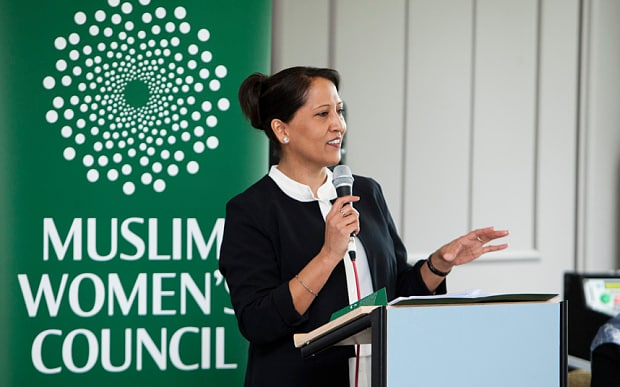BIRMINGHAM – A UK employment lawyer joined high-ranking female Muslim voices condemning Tuesday’s European Court of Justice’s (ECJ) ruling allowing employers to ban the wearing of visible religious symbols, such as headscarves and other religious signs.
The opinion was issued by Juliane Kokott, an ECJ Advocate General, on a case brought by the security services firm G4S against a former employee.
In 2006, Samira Achbita was working as a receptionist for the firm, in Belgium, when she told bosses she wished to wear hijab.
The company subsequently introduced a formal ban of religious symbols in the workplace, replacing what it said had been an already existing “unwritten rule.”
As a result, Achbita claimed a wrongful dismissal.
Gillian Howard, is an employment lawyer, specializing in discrimination cases. She feels professional outrage at the decision, questioning whether EU legal guidance is bowing to the letter of the law, whilst ignoring its spirit.
“What the European court seems to have done is to literally have taken a rule that bans anybody in the workplace showing any signs of observance to a religious, political or philosophical belief, and said, that doesn’t discriminate against a particular religious or political group, because the ban applies to everybody,” she told AboutIslam.
The question is whether applying a legal edict, in relation to symbols of faith, will in practice have the same impact on all employees.
Tucking a crucifix beneath a shirt or blouse is an easy way of protecting one religious symbol. Wearing hijab, or a turban, due to religious observance means always having your faith on display with no alternative option, barring removal.
For this reason, Howard questions the rulings universality.
“This ruling endorses the principle that we are all the ‘same’ and therefore we don’t need different rules for different groups. Most employers have accepted, for example, that pregnant women need advantageous terms for when they feel ill or take maternity leave.”

Sameness or Fairness
There was a case several years ago, with a similar argument to that posed G4s versus Achbita. An employer allowed sexually explicit images of women to be posted all over the office.
This gravely offended female workers. An employment tribunal held that whilst everybody was exposed to the same posters in the same way, the offensive effect on women was different.
This meant that although everyone had the same treatment it had a differently disadvantageous effect on one group. The female employees won the case.
Whilst outwardly effecting ‘fairness’, the ECJ ruling has received widespread approval by far-right groups across Europe.
In Germany, Alternative für Deutschland, the right-wing populist party was pleased with the decision. AfD’s Berlin leader, Georg Pazderski said: “The ECJ’s ruling sends out the right signal, especially for Germany,” adding “Of course companies have to be allowed to ban the wearing of headscarves.”
Yasmine Dar is a Manchester City Councilor seeking selection by the Labour Party in the upcoming Gorton by-election. She sees the ruling as adding to an environment of distrust and hate.
She told AboutIslam: “We need to recognize that this is an attack on freedom and free will. Imposing laws on how to dress, rather than tackling the breadth of inequalities we face as women. The time and effort put into developing this policy could have been better spent challenging women’s inequality.
“Muslim, Jewish, Sikh, Buddhist and Christians who dress modestly are being targeted.”
Bana Gora, CEO, of Muslim Women’s Council (MCW), agrees.
“This ruling is a violation of women’s rights and autonomy. Given the alarming rise in hate crimes, the timing of this ruling will only embolden growing far-right sentiment which has been resurrected since Brexit,” she told AboutIslam.
“Instead of focusing on the hijab, which has been so grossly dissected by the media and politicians alike, we must focus on the more pressing issues on our doorstep. The last thing we want to do is to alienate Muslim women, who are already heavily disenfranchised.”
The right-wing parties in Europe are clear who this legal ruling is aimed towards. Their approval should sound alarm bells to legislators and employers in the UK, who currently work within parameters more focused on diversity, than the principle of ‘sameness’ or the anti-theism of France.

Intimidating
Murtaza Shaikh is Head of Law at Averroes (www.averroes.org.uk), an independent and non-partisan think tank. He specializes in minority rights, conflict prevention and freedom of religion He explains why the ruling missed the main point of the case.
“The Court limited itself strictly to the question of direct discrimination, when the more substantive matter was the freedom of religion. The Muslim receptionist, Achbita, had chosen to wear the headscarf as part of her religious beliefs, part way through her employment. Her issue was not that she was being treated differently from her colleagues, who may have held other religious, political or philosophical beliefs, but that she was not being allowed to express her religious identity and be availed the opportunity to continue her work. (http://islamicate.co.uk/headscarf-ruling/)”
“How does the wearing of a headscarf or the parallel of a Sikh turban or a crucifix necklace effect business, which in this case is a private security company? Can religious affiliation not be inferred from other factors such as name, ethnic or national identity or certain behaviors? Should such employees be given neutral names and would not they inadvertently end up being western Christian ones?”
Howard, the lawyer, added: “I am a reform Jew. Orthodox men and women will naturally go and work with a Jewish firm, which will close early on Friday for Sabbath, allows all the Jewish holidays, men to wear Kippah (skullcap) and women to leave early etcetera.”
“Anyone who is Orthodox Jewish wouldn’t necessarily get a job with a firm which doesn’t appreciate those rules. So, the major target for these discriminatory policies will be Muslim women in particular.”
